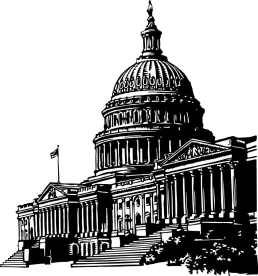On March 14, 2020, the House of Representatives voted 363-40 to pass H.R. 6201: Families First Coronavirus Response Act—a relief package that, among other things, contains several provisions affecting employers. The Senate has not yet scheduled a time to vote on the bill, although it is expected that a vote will occur this week.
Below is a summary of the key employment-related aspects of the bill. Importantly, please note that the bill only applies to employers with fewer than 500 employees. Further, the below provisions are subject to change by the Senate and can also be affected by specific state and local laws.
-
Paid Job-Protected Leave Under the Family and Medical Leave Act
The bill provides employees of employers with fewer than 500 employees with the right to take up to 12 weeks of job-protected leave under the Family and Medical Leave Act (“FMLA”).
Why is this different? H.R. 6201 requires that ten of these twelve weeks be paid at a rate of no less than two-thirds of the employee’s usual rate of pay. (FMLA leave for all other purposes remains unpaid.)
To be eligible for paid leave, employees must have been on the employer’s payroll for 30 days and may use emergency FMLA leave for the following reasons:
- To adhere to a requirement or recommendation to quarantine due to exposure to or symptoms of coronavirus;
- To care for a family member who is adhering to a requirement or recommendation to quarantine due to exposure to or symptoms of coronavirus; and
- To care for a child of an employee if the child’s school or place of care has been closed, or the childcare provider is unavailable, due to the coronavirus.
The first two weeks of leave may be unpaid; the employee may choose to substitute accrued paid time off or other medical or sick leave during this period, but an employer cannot require an employee to do so. After the first two weeks of unpaid leave, employers must continue paid FMLA leave at a rate of no less than two-thirds of the employee’s usual rate of pay.
As with traditional FMLA leave, this leave is job-protected and an employer must return the employee to the same or equivalent position upon their return to work. The bill outlines an exception for employers with less than 25 employees if the employee’s job no longer exists due to the coronavirus pandemic, which requires employers to make reasonable efforts to restore the employee to an equivalent position over a one-year period.
The bill grants the Secretary of Labor the authority to issue regulations exempting: (1) certain health care providers and emergency responders from taking leave under the bill; and (2) small business with fewer than 50 employees from the requirements of the bill if it would jeopardize the viability of the business.
Please note that this amendment to the FMLA would expire on December 31, 2020.
-
14 Days of Paid Sick Leave
Under the bill, employers with fewer than 500 employees will be required to provide full-time employees with 2 weeks (80 hours) of paid sick leave for the following reasons:
- To self-isolate because of a diagnosis of COVID-19, or to comply with a recommendation or order to quarantine due to exposure or exhibition of symptoms;
- To obtain a medical diagnosis or care if the employee is experiencing symptoms of the coronavirus;
- To care for a family member who is self-isolating due to a diagnosis of coronavirus, experiencing symptoms of coronavirus and needs to obtain medical diagnosis or care, or quarantining due to exposure or exhibition of symptoms; or
- To care for a child whose school has closed, or childcare provider is unavailable, due to the coronavirus.
Employers must compensate employees for any paid sick time they take at their regular rates of pay (unless the leave is being used to care for a family member or child, in which case the employee is only entitled to two-thirds of his or her regular rate of pay). The sick leave is available for immediate use by employees, regardless of length of employment.
Additionally, part-time employees are entitled to the number of hours of paid sick time equal to the number of hours they work, on average, over a 2-week period.
Notably, employers who already provide paid leave to employees on the day before the bill is enacted must provide this paid leave in addition to any paid leave already provided—and may not change their paid leave policies on or after the date of enactment to avoid compliance. Finally, employers cannot require employees to utilize other paid leave before using the paid leave provided by this bill.
Like the amendment to the FMLA, this aspect of the bill would also expire on December 31, 2020.
-
Tax Credits for Paid FMLA and Sick Leave and Grant of $1 Billion Dollars for Emergency Unemployment Insurance
The bill, in its current form, provides for a series of refundable tax credits for employers providing paid emergency sick leave or paid FMLA. The credits are as follows:
- A refundable tax credit for employers equal to 100 percent of qualified family leave wages required to be paid by the Emergency Family and Medical Leave Expansion Act that are paid by an employer for each calendar quarter. The tax credit is allowed against the tax imposed by section 3111(a) (the employer portion of Social Security taxes). The amount of qualified family leave wages taken into account for each employee is capped at $200 per day and $10,000 for all calendar quarters. If the credit exceeds the employer’s total liability under section 3111(a) for all employees for any calendar quarter, the excess credit is refundable to the employer.
- A refundable tax credit for employers equal to 100 percent of qualified paid sick leave wages required to be paid by the Emergency Paid Sick Leave Act that are paid by an employer for each calendar quarter. The tax credit is allowed against the tax imposed by section 3111(a) of the Internal Revenue Code (the employer portion of Social Security taxes).
Finally, the bill would provide $1 billion in grants to states for emergency unemployment insurance, half of which would be transferred to the states within 60 days after the enactment of the bill (so long as the state complies with certain requirements, such as requiring employers to notify employees of the availability of unemployment compensation and permitting individuals to apply for unemployment compensation in at least two of the following ways—in-person, by phone, or online). The remainder of the grant would be reserved for states in which the number of unemployment compensation claims has increased by at least 10% over the same quarter in the prior calendar year. To receive access to the second portion of the grant, states must, among other things, make it easier for individuals to obtain unemployment compensation by waiving work search requirements and waiting periods.
We will continue to provide updates as this bill makes its way through the Senate.




 />i
/>i

